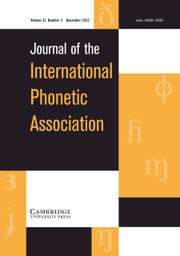No CrossRef data available.
Article contents
Arse and ass
Published online by Cambridge University Press: 06 February 2009
Extract
Anglo-Saxon had a word œrs, meaning ‘rump, podex, buttocks,’ which evolved into Early Modern English arse, pronounced approximately [aɹs]. Normally, this evolution would have eventually produced a word spelled arse and pronounced [ɑːs] in Southern British and [ɑɹs] in General American. In Southern British, this development followed its normal course. In Anglophone North America, however, the word developed differently. In the eighteenth and nineteenth centuries, a tendency appeared in America to level the combination ar = [aɹ], when followed by a voiceless lingual in certain combinations, with ‘short a’ = [æ]. Hence, for cartridge, hearth, parcel, appeared the pronunciations [ˈkætrιdƷ, hæθ,  ].
].
- Type
- Articles
- Information
- Journal of the International Phonetic Association , Volume 1 , Issue 2 , December 1971 , pp. 79 - 80
- Copyright
- Copyright © Journal of the International Phonetic Association 1971


